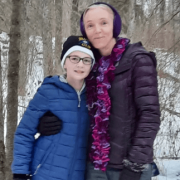Many Childhood Celiac Patients Do Not Seek Follow-Up Care as Adults
“Unless symptoms worsen, many patients diagnosed with celiac disease as children do not pursue follow-up gastroenterology care as adults.”
- Digestive Diseases Week (DDW) 2016. 1

Norelle Reilly, MD
“Symptoms drive young adults to seek ongoing care rather than care improving symptom outcomes, as we had initially presumed,” Norelle Reilly, MD, from the division of pediatric gastroenterology and the Celiac Disease Center at Columbia University Medical Center in New York City said during her presentation. “Providers caring for children and adolescents with celiac disease should educate early as to the importance of ongoing care, emphasize the importance of follow-up and the reasons for follow-up, particularly with patients who lack symptoms and may not seek care otherwise and to provide a referral, and formally transition the patient to adult care to improve compliance.”
 Reilly and colleagues sent out 33-question survey to nearly 8,000 recipients via the medical center’s proprietary distribution list and received 98 qualified surveys in return.
Reilly and colleagues sent out 33-question survey to nearly 8,000 recipients via the medical center’s proprietary distribution list and received 98 qualified surveys in return.
- “A surprising 37% of our respondents identified that they were seeking no ongoing care for celiac disease,” Reilly said.
- Of these, respondents reported a median interval of care from 2 to 5 years and sometimes as long as 10 years since they had seen a medical provider for their celiac disease. Those who were under care had a median interval of 6 months between provider visits, Reilly said.
- Despite expectations, Reilly reported that there was no association between having a provider and gluten-free adherence and no impact of employment or status as a student on whether respondents sought adult care.
- Receipt of referral and an understanding of the importance of follow-up most strongly predicted seeking care with an adult gastroenterologist. Yet only 34% of respondents reported receiving a referral to an adult provider, Reilly said.
- “Rather than the expected social factors, receipt of a referral and an understanding of the importance of follow-up most strongly predicted seeking care with an adult gastroenterologist,” she said.
- Older age at diagnosis and higher celiac symptom index score were also linked to follow-up care with an adult provider, though after multivariate analysis, only age at diagnosis maintained its strength.
- Only 40% of those diagnosed younger than 13 years of age sought care as adults and their mean celiac symptom index. Conversely, 75% of those diagnosed at age 13 or older sought adult care and their celiac symptom index skewed higher.
- “Those diagnosed with celiac disease at a later age in childhood had greater celiac symptom index scores or more symptoms, possibly explaining why these individuals who are diagnosed later in adolescence are more likely to see an adult gastroenterologist,” she said.
However, Reilly acknowledged the small sample size and survey design were limiting.
- “A large proportion of patients diagnosed with celiac disease in childhood do not seek follow-up care as adults, particularly those diagnosed earlier in childhood who may have fewer ongoing symptoms,” Reilly said. “Patients diagnosed later in childhood had greater frequency of symptoms and sought adult gastroenterology care most predictably.”
Commentary – Benjamin Lebwohl, MD, MS
 “To date there is little known about the hand-off between pediatrics and adult care in the area of celiac disease. This is a known vulnerable spot in our longitudinal care of patients with any chronic condition. Often people in their late teens and early 20s are caught in a limbo between the pediatric and adult side, and this has been studied previously in inflammatory bowel disease and other chronic conditions, but to our knowledge not in celiac disease.
“To date there is little known about the hand-off between pediatrics and adult care in the area of celiac disease. This is a known vulnerable spot in our longitudinal care of patients with any chronic condition. Often people in their late teens and early 20s are caught in a limbo between the pediatric and adult side, and this has been studied previously in inflammatory bowel disease and other chronic conditions, but to our knowledge not in celiac disease.
This team of investigators specifically wanted to know about the follow-up in patients who are in this transition period. They used a questionnaire that was specifically aimed at young adults with celiac disease between the ages of 18 and 25, and found a substantial proportion — more than a third of these young adults — were not having any follow-up with a celiac disease specialist, and about a quarter admitted to lapses in adherence to the gluten-free diet.
This underscores the notion that as a health care system we have a lot of work to do to help guide these patients through a successful transition to adult care. This age group is a potentially vulnerable population with regard to chronic conditions. This is the age group in which many are in college and are away from their parents for the first time, and because the management of celiac disease requires dietary intervention, this group of individuals is at risk for neglecting the primary treatment of celiac disease, and this could set patients up for both short-term and long-term health problems.” 2
Reference:
Reilly N, et al. Abstract #35. Presented at: Digestive Disease Week; May 21-24, 2016; San Diego.
Disclosure
Reilly reports acting as a consultant and being on the advisory committee for ImmusanT.
- 1
- 2 Benjamin Lebwohl, MD, MS
- Herbert Irving Assistant Professor of Medicine and Epidemiology
- The Celiac Disease Center Columbia University Medical Center, New York City
- Lebwohl reports no relevant financial disclosures













